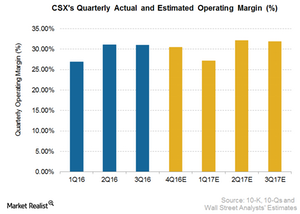Will CSX’s 4Q16 Operating Margin Exceed Analysts’ Estimates?
For CSX Corporation (CSX), Reuters-surveyed analysts estimate an operating margin of 30.5% for 4Q16, compared to an operating margin of 28.4% in 4Q15.
Dec. 4 2020, Updated 10:53 a.m. ET

CSX’s 4Q16 operating margin
For CSX Corporation (CSX), Reuters-surveyed analysts estimate an operating margin of 30.5% for 4Q16, compared to an operating margin of 28.4% in 4Q15.
This estimate reflects an anticipated margin expansion of 210 basis points. Barring its 1Q17 results, analysts expect slightly higher operating margins from the company in 2017 compared to 2016.
Analysts expect CSX’s EBITDA (earnings before interest, tax, depreciation, and amortization) margin to be 41.6% in 4Q16. The company’s EBITDA margin was 39.7% in 4Q15.
Will CSX deliver higher operating margins?
In its 4Q16 guidance, CSX reiterated its continued focus on operational improvements. CSX achieved ~$550.0 million in cost savings leading up to 3Q16. These savings included volume-related savings and efficiency initiatives.
CSX’s 2016 efficiency savings are expected to be ~$400.0 million, including $100.0 million in coal network–related savings, $150.0 million from normal productivity initiatives, and the balance from increased train lengths.
The company has also been able to reduce its terminal dwell time. In the current era of moderate fuel costs, this move should improve train speeds and reduce overall operating costs. The company has also been investing in sidings in order to drive longer trains. On the compensation front, a reduction of 5,200 employees since 2Q15 has likely brought down CSX’s compensation expenses.
The number of CSX’s active locomotives fell 10% in 4Q16, likely resulting in incremental efficiency for the company. The fall should aid the company’s objective of achieving a 40% operating margin in the long term.
Peers’ operating margins
Investors should note that major Eastern US railroad companies such as CSX and Norfolk Southern (NSC) have historically operated at lower operating margins, typically ranging from 25% to 30% due to their compact regional network reaches.
Canadian counterparts Canadian National Railway Company (CNI) and Canadian Pacific Railway (CP) have operated at margins ranging from 35% to 40%. Longer end-to-end runs out help these Canadian railroads to achieve these margins.
All major US railroad companies make up 5.1% of the portfolio holdings of the First Trust Industrials/Producer Durables AlphaDEX ETF (FXR).
In the next article, we’ll take a look at analysts’ recommendations for CSX.
